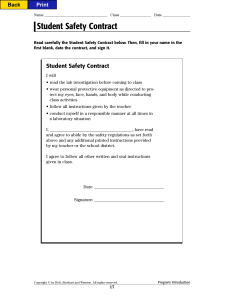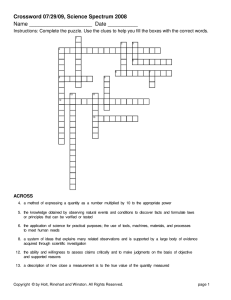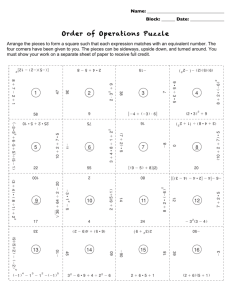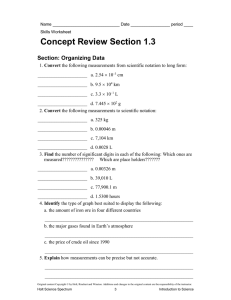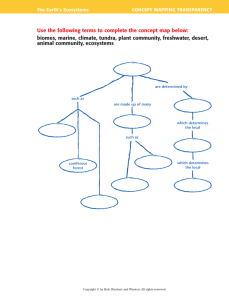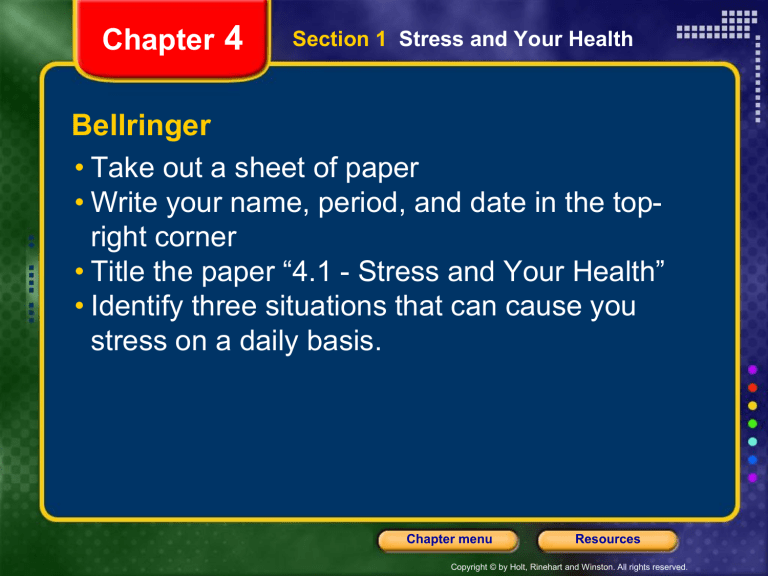
Chapter 4 Section 1 Stress and Your Health Bellringer • Take out a sheet of paper • Write your name, period, and date in the topright corner • Title the paper “4.1 - Stress and Your Health” • Identify three situations that can cause you stress on a daily basis. Chapter menu Resources Copyright © by Holt, Rinehart and Winston. All rights reserved. Chapter 4 Section 1 Stress and Your Health What’s Your Health IQ? Indicate how frequently you engage in each of the following behaviors. Keep track of your score. 1. Never 2. Occasionally 3. Most of the time 4. All of the time Chapter menu Resources Copyright © by Holt, Rinehart and Winston. All rights reserved. Chapter 4 Section 1 Stress and Your Health What’s Your Health IQ? I exercise and eat well. 1. Never 2. Occasionally 3. Most of the time 4. All of the time Chapter menu Resources Copyright © by Holt, Rinehart and Winston. All rights reserved. Chapter 4 Section 1 Stress and Your Health What’s Your Health IQ? I make time in my schedule to do the things that I really enjoy. 1. Never 2. Occasionally 3. Most of the time 4. All of the time Chapter menu Resources Copyright © by Holt, Rinehart and Winston. All rights reserved. Chapter 4 Section 1 Stress and Your Health What’s Your Health IQ? I ask for support from family and friends when I feel too much stress. 1. Never 2. Occasionally 3. Most of the time 4. All of the time Chapter menu Resources Copyright © by Holt, Rinehart and Winston. All rights reserved. Chapter 4 Section 1 Stress and Your Health What’s Your Health IQ? I have an optimistic view of changes in my life. 1. Never 2. Occasionally 3. Most of the time 4. All of the time Chapter menu Resources Copyright © by Holt, Rinehart and Winston. All rights reserved. Chapter 4 Section 1 Stress and Your Health What’s Your Health IQ? I do the important projects I want to accomplish first. 1. Never 2. Occasionally 3. Most of the time 4. All of the time Chapter menu Resources Copyright © by Holt, Rinehart and Winston. All rights reserved. Chapter 4 Section 1 Stress and Your Health What’s Your Health IQ? I say (or would say) no if my boss repeatedly asks me to work late on a school night. 1. Never 2. Occasionally 3. Most of the time 4. All of the time Chapter menu Resources Copyright © by Holt, Rinehart and Winston. All rights reserved. Chapter 4 Section 1 Stress and Your Health What’s Your Health IQ? Find your total score from all 6 questions. ● 19-24: You are doing an excellent job of managing stress ● 10-18: You are doing very well overall but have areas in which you can improve how well you manage stress ● 0-9: You should be making some major changes in the way you deal with stress or you may develop a stress-related illness. Chapter menu Resources Copyright © by Holt, Rinehart and Winston. All rights reserved. Chapter 4 Section 1 Stress and Your Health Objectives • Describe five different causes of stress. • Describe the body’s physical response to stress. • Differentiate between positive and negative stress. • Describe how stress can make you sick. Chapter menu Resources Copyright © by Holt, Rinehart and Winston. All rights reserved. Chapter 4 Section 1 Stress and Your Health • Describe a specific stressful experience you have had. Discuss: ○ How it made you feel AND ○ How your body responded Chapter menu Resources Copyright © by Holt, Rinehart and Winston. All rights reserved. Chapter 4 Section 1 Stress and Your Health What Causes Stress? • Environmental stressors are conditions or events in your physical environment that cause you stress. • Biological stressors are conditions that make it difficult for your body to take part in daily activities. Chapter menu Resources Copyright © by Holt, Rinehart and Winston. All rights reserved. Chapter 4 Section 1 Stress and Your Health What Causes Stress? • Thinking stressors can be any type of mental challenge. • Behavioral stressors are unhealthy behaviors that cause stress. • Life change stressors are major life changes—negative or positive—that lead to stress. Chapter menu Resources Copyright © by Holt, Rinehart and Winston. All rights reserved. Chapter 4 Section 1 Stress and Your Health Physical Response to Stress • In the fight-or-flight response, your body releases epinephrine. • Epinephrine triggers the following changes: ● Breathing speeds up ● Heartbeat increases ● Muscles tense up ● Pupils dilate ● Digestion stops ● Blood sugar increases Chapter menu Resources Copyright © by Holt, Rinehart and Winston. All rights reserved. Chapter 4 Section 1 Stress and Your Health Emotional and Behavioral Response to Stress • Positive Stress Stress that energizes you and helps you reach a goal is called eustress. • Negative Stress Stress that makes you sick or keeps you from reaching a goal is called distress. • When you are experiencing stress, you should try to adjust your attitude and make the stress positive. Chapter menu Resources Copyright © by Holt, Rinehart and Winston. All rights reserved. Chapter menu Resources Copyright © by Holt, Rinehart and Winston. All rights reserved. Chapter 4 Section 1 Stress and Your Health Long-term Stress Can Make You Sick • The General Adaptation Syndrome describes three stages in the relationship between stress and disease. 1. Alarm Stage The body and mind become very alert in response to stressors. 2. Resistance Stage The body becomes more resistant to disease and injury. 3. Exhaustion Stage Extreme exhaustion sets in. Organs and systems in the body may start to suffer or fail. Chapter menu Resources Copyright © by Holt, Rinehart and Winston. All rights reserved. Chapter 4 Section 1 Stress and Your Health Chapter menu Resources Copyright © by Holt, Rinehart and Winston. All rights reserved. Chapter 4 Section 1 Stress and Your Health Assignment • Read Section 4.1 • Answer the questions in the section review on the same paper you used today • Due at the beginning of the period tomorrow. Late work will not be accepted, Chapter menu Resources Copyright © by Holt, Rinehart and Winston. All rights reserved.
